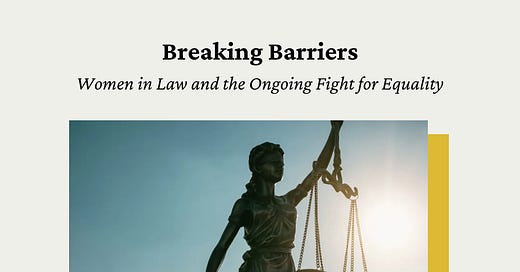As we mark International Women’s Day, it is both a celebration and a call to action. The legal profession has long been a battleground for gender equality—one where women have fought tirelessly to break barriers, shatter stereotypes, and claim their rightful place in courtrooms, boardrooms, and beyond. While progress has been undeniable, the road ahead still demands vigilance, advocacy, and systemic change.
A Legacy of Trailblazers
The history of women in law is one of resilience and determination. In the early 20th century, pioneers like Myra Bradwell, Belva Lockwood, and Charlotte E. Ray faced institutional barriers that denied them the right to practice law simply because of their gender. It took landmark legal challenges and relentless activism for women to earn the right to become solicitors, barristers, judges, and lawmakers. Today, figures like UK Supreme Court Justice Baroness Brenda Hale and U.S. Supreme Court Justice Ketanji Brown Jackson continue to inspire a new generation of women in the legal field.
Progress in Numbers
According to the American Bar Association (ABA), women now make up more than 55% of law school students in the United States, a sharp contrast from the early 1970s when the figure stood at just 10%. The UK’s Solicitors Regulation Authority reports that women account for over 52% of practising solicitors, reflecting an encouraging trend in legal education and entry into the profession.
However, representation at the highest levels remains a challenge. In the U.S., only 22% of equity partners in major law firms are women, and the number drops further for women of colour, who make up just 4%. A 2023 report from McKinsey & Company found that female lawyers are 29% more likely than their male counterparts to leave the profession due to barriers like workplace culture, gender bias, and lack of advancement opportunities. Similarly, in the UK, just 35% of barristers and 30% of judges are women, according to the Bar Council.
Recent Developments Showcasing Growth
Despite these challenges, recent developments highlight significant progress in gender equality within the legal profession. In 2023, the UK saw a record-breaking appointment of female judges, with 45% of new judicial appointments being women. Additionally, the Law Society of England and Wales launched new initiatives aimed at addressing gender disparities, including the Women in Law Pledge, which encourages firms to set measurable gender diversity targets.
Internationally, the European Union has passed new directives to ensure gender balance in leadership positions within major companies, setting a precedent for the legal sector to follow. In the United States, several top law firms have committed to increasing female representation in leadership roles through structured sponsorship and mentorship programmes.
Moreover, the rise of women-led law firms is reshaping the profession, proving that alternative models of leadership can thrive. High-profile cases led by female barristers and solicitors continue to set legal precedents in areas such as human rights, corporate governance, and criminal justice reform.
The Path Forward
As we reflect on the contributions of women in law, it is imperative to commit to actionable change. Law firms and legal institutions must prioritise mentorship programmes, equitable promotion practices, and policies that support work-life balance. Legislative efforts to close the gender pay gap, strengthen anti-harassment laws, and ensure fair representation in judicial appointments must remain at the forefront.
Organisations like the International Bar Association (IBA) and the United Nations’ Women’s Rights Division continue to push for gender equity in legal institutions worldwide. Their reports highlight the importance of transparency in promotions, equitable parental leave policies, and comprehensive diversity initiatives to ensure that women do not just enter the profession but thrive in it.
Call to Action
To all members of the legal community: let this day serve as a reaffirmation of our collective responsibility to uphold justice and equality. Whether through mentorship, advocacy, or policy change, every action counts. The pursuit of a truly inclusive legal profession is not just a women’s issue—it is a cause that demands the commitment of all.



